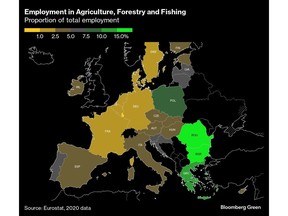Emmanuel Macron’s government will try to quell French farmers’ fury over falling incomes and strict EU regulations, in a bid to prevent protests from escalating into a blockade of Paris.

Article content
(Bloomberg) — Emmanuel Macron’s government will try to defuse French farmers’ fury over falling incomes and tough EU regulations, aiming to prevent protests from escalating into a blockade of Paris.
Protests that began in the south of France spread throughout the week, as farmers blocked main roads and blocked traffic across the country with slow-moving processions. Some unions urged their members to cut main routes to Paris on Friday afternoon.
Advertisement 2
Article content
Article content
Prime Minister Gabriel Attal, appointed less than a month ago to give new impetus to a government torn by disagreements over immigration, is due to unveil his administration’s response later Friday. France is tackling protests that reflect dissent in European countries, notably Germany and Poland.
The government is expected to announce measures to cut red tape and offset the impact of reduced subsidies on non-road diesel. He could also pledge to accelerate financial aid to farmers affected by flooding or livestock diseases.
“There is a real risk of a widespread outbreak,” said Hortense de Padirac, a Paris-based political scientist who teaches at the University of Sciences Po. “Attal will have to show that he is up to the mission entrusted to him by the president. It’s Attal’s credibility that is at stake.”
Many of the farmers’ complaints center on what they see as a tangle of ever-changing regulations that have pushed many to the brink of bankruptcy. The European Union began a so-called strategic dialogue on Thursday to address growing divisions over agriculture across the bloc. But these efforts are a slow process and it is unclear what the EU can do next to quell the protests.
Article content
Advertisement 3
Article content
Although there has been little violence so far, French farmers’ complaints about the cost of living and fuel prices echo the Yellow Vest protests that began in 2018 and plagued the president’s first term of Macron.
In 2019, Macron responded to the Yellow Vests with tax cuts and support for low incomes that the government at the time estimated at 17 billion euros ($18.5 billion). But this time, his room for maneuver is reduced as his government struggles to tackle the enormous debt burden accumulated during the Covid-19 pandemic and the energy crisis.
On Wednesday, France’s main union FNSEA consolidated the grievances into a litany of demands ranging from tax credits for agricultural fuels to exemptions from EU rules on fallow land. “Incomprehensible decisions are raining down on our sector,” declared the union. “We need profound structural changes. »
Part of the challenge for Macron and Attal is the overwhelming public support for the farmers’ protests, despite the widespread travel chaos. According to an Odoxa-Backbone Consulting survey carried out among 1,005 people for the newspaper Le Figaro, 89% of French people support the movement.
Advertisement 4
Article content
Far-right parties are taking advantage of the protests to strengthen their campaign for the European elections in June. In France, Marine Le Pen’s National Rally is already ahead of Macron’s political party, according to opinion polls.
“As far as the capital is concerned, we are gaining strength and the movement is extending to the whole of France,” declared Arnaud Gaillot, president of the young farmers’ union Jeunes Agriculteurs, during a demonstration on the A6 motorway. in Yonne to the south-east of Paris.
“The capital should be one of the last options, but we can imagine all kinds of things,” Gaillot said. “The ball is in the government’s court to avoid paralyzing a country that has other problems.”
—With help from Alan Katz.
Article content



